Court’s Decision
The Delhi High Court dismissed the appeal challenging the conviction of the appellant under Sections 394/397 of the Indian Penal Code and Section 25 of the Arms Act. Upholding the trial court’s judgment, the Court found the testimonies of the complainant and the two injured eyewitnesses consistent, credible, and corroborated by medical evidence. The Court rejected the defence’s arguments regarding non-examination of certain family members and the absence of the accused’s medical record, holding that these omissions did not create reasonable doubt. The appellant’s conviction and sentence were affirmed, and his bail bonds cancelled, with directions to surrender immediately.
Facts
The case arose from an incident in the early hours of 8 December 2021, when the complainant was sleeping outside his home. The appellant approached him, threatened him with a knife, and robbed ₹200. The complainant’s two sons intervened, and in the struggle, both sustained knife injuries. The appellant was overpowered, disarmed, and handed over to the police, along with the knife and the stolen money. Medical examination confirmed injuries on the victims’ hands caused by a sharp weapon. The trial court convicted the appellant, sentencing him to seven years’ rigorous imprisonment for robbery with a deadly weapon and two years for the Arms Act offence, with sentences to run concurrently.
Issues
- Whether the conviction could be sustained when certain family members present at the scene were not examined.
- Whether the absence of the accused’s medical examination record undermined the prosecution’s case.
- Whether the prosecution proved beyond reasonable doubt that the injuries were caused by the appellant with the knife recovered.
Petitioner’s Arguments
The appellant contended that the prosecution’s case was unreliable because the complainant’s wife, daughter-in-law, and grandson—present during the incident—were neither examined nor their statements recorded. The defence argued that the investigating officer admitted the accused was taken for medical examination, yet no MLC was placed on record. They also claimed that the injuries could not be conclusively linked to the knife allegedly used, rendering the conviction unsafe.
Respondent’s Arguments
The State argued that the evidence was overwhelming. The complainant and the injured witnesses gave consistent and corroborated accounts of the robbery and assault. The knife and stolen money were recovered from the accused at the scene. Medical evidence confirmed the injuries and the use of a sharp weapon. The absence of testimony from other family members was inconsequential, as the direct witnesses had already established the prosecution case. The accused’s non-production of medical records was immaterial, given the weight of the other evidence.
Analysis of the Law
The Court examined the evidentiary value of consistent eyewitness testimony, especially when corroborated by medical evidence. It reiterated that the non-examination of all witnesses present at the scene does not vitiate the trial if the witnesses examined are trustworthy and their evidence is reliable. The Court also emphasised that minor procedural omissions or absence of certain documents (like the accused’s MLC) cannot override credible and corroborated testimonies.
Precedent Analysis
The Court applied established principles from prior judgments holding that:
- Convictions can be based on the testimony of a few credible witnesses, even if others are available but not examined.
- Medical evidence serves as corroboration but is not the sole determinant of guilt if credible ocular evidence exists.
These precedents supported the conclusion that the prosecution’s case was proven beyond reasonable doubt.
Court’s Reasoning
The Court found that the complainant and his sons gave consistent accounts, identifying the accused and describing the assault. Their testimonies were corroborated by medical records confirming injuries caused by a sharp weapon. The Court held that the absence of statements from other family members did not create doubt, as their evidence would have been cumulative. The appellant’s failure to present a plausible defence or explanation for his apprehension at the scene further strengthened the prosecution’s case.
Conclusion
The High Court dismissed the appeal, upheld the conviction and sentence, cancelled the appellant’s bail bonds, and directed his immediate surrender. The Court reiterated that consistent and corroborated eyewitness evidence, supported by medical records, is sufficient to sustain a conviction.
Implications
This judgment reinforces the principle that credible, consistent eyewitness testimony, when corroborated by medical evidence, is sufficient for conviction even without examining all potential witnesses. It also clarifies that procedural gaps like the absence of the accused’s MLC cannot override strong direct evidence.
Cases Referred
The Court relied on settled principles from earlier judgments that non-examination of certain witnesses is not fatal when the testimony of examined witnesses is credible and corroborated by other evidence, and that medical evidence is corroborative rather than conclusive.
FAQs
1. Can a conviction be upheld without examining all eyewitnesses?
Yes. If the witnesses examined are credible and their testimony is corroborated, the non-examination of other potential eyewitnesses does not weaken the prosecution case.
2. Does the absence of the accused’s medical report affect the prosecution case?
No. If other evidence overwhelmingly establishes guilt, the absence of the accused’s MLC is not fatal.
3. How important is medical evidence in corroborating eyewitness testimony?
Medical evidence is important for corroboration but is not the sole basis for conviction if the eyewitness account is credible and consistent.



